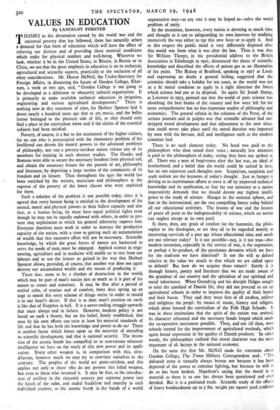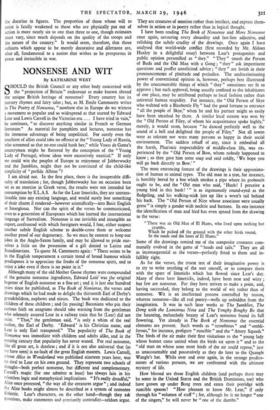VALUES IN EDUCATION
By LANCELOT FORSTER
THANKS to the devastation caused by the world war and the universal poverty that has followed, there has naturally arisen a demand for that form of education which will have the effect of relieving our distress and of providing those material conditions which make for physical comfort and well-being. Wherever we look, whether it be in the United States, in Britain, in Russia or in China, we see that the great emphasis in education is on its technical, agricultural and scientific aspects, practically to the exclusion of all other considerations. Mr. Hector McNeil, the Under-Secretary for Foreign Affairs, in discussing the future of Gordon College, Khar- tum, a week or two ago, said, " Gordon College is not going to be developed as a dilettante or obscurely cultural organisation. It is primarily to make available technical education in irrigation, engineering and various agricultural developments." There is nothing new in this statement of aims, for Herbert Spencer laid it down nearly a hundred years ago that as art, music, and the belles lettres belonged to the pleasure side of life, so they should only find a place in the curriculum when and if the claims of the essential subjects had been satisfied.
Poverty, of course, is a bar to the attainment of the higher culture, for no one who is preoccupied with the elementary problem of his livelihood can devote his mental powers to the advanced problems of philosophy, nor can a poverty-stricken nation release any of its members for training in such abstract studies. The Greeks and Romans were able to secure the necessary freedom from physical toil, and obtain the necessary leisure for the pursuit of art, philosophy and literature, by depriving a large section of the community of its freedom and its leisure. Thus throughout the ages the world has been enriched by the writers, musicians and philosophers at the expense of the poverty of the lower classes who were exploited for them.
Such a solution of the problem is not possible today, since it is agreed that every human being is entitled to the development of his mental, moral and physical powers to their fullest capacity and also that, as a human being, he must have equal political rights even though he may not be equally endowed with others, in order to pre- vent that exploitation to which his general inferiority exposes him. Everyone therefore must work in order to increase the productive capacity of the nation, with a view to getting such an accumulation of wealth that this excessive effort will not be necessary. Scientific knowledge, by which the great forces of nature are harnessed to serve the needs of men, must be enlarged. Applied science in engi- neering, agriculture and in medicine will enable us to rest from our labours and to use the leisure so gained in the way that Herbert Spencer allows, provided, of course, that another war does not again destroy our accumulated wealth and the means of producing it.
There does seem to be a rhythm of destruction in the world, which may be part of man's nature just as much as it is part of his nature to create and construct. It may be that after a period of settled calm, of routine and of comfort, there does spring up an urge to smash this sorry scheme of things entire in order to mould it to our heart's desire. If that is so then man's position on earth is like that of Sisyphus in hell. It is a never-ending struggle upwards that must always end in failure. However, modern policy is not based on such a theory, but on the belief, firmly established, that man by his own efforts can raise at least his material standards of life and that he has both the knowledge and power to do so' There is another factor which forces upon us the necessity of attending to scientific development, and that is national security. The inven- tion of the atomic bomb has compelled us to concentrate whatever intelligence we have on the study of this new power and its appli- cation. Every other weapon is, in comparison with this, ante- diluvian, however much we may try to convince ourselves to the contrary. The peoples of the world are panic-stricken, and this applies not only to those who do not possess this lethal weapon, but even to those who invented it. It may be that, as the introduc- tion of artillery in the sixteenth century put supreme power into the hands of the ruler, and ended feudalism and anarchy in each individual country, so the atomic bomb in the hands of a world organisation may—at any rate it may be hoped so—solve the world problem of unity.
In the meantime, however, every nation is devoting as much time and thought as it can to safeguarding its own interests by studying intensively the way either to tap this new force or to apply it. And in this respect the public mind is very differently disposed after this world war from what it was after the last. Then it was that Sir William Thorpe, in his presidential address to -the British Association in Edinburgh in 1921, denounced the abuse of scientific knowledge and described the effects of poison gas as an illustration of his point. The Bishop of Bradford, speaking in 1927 at Leeds and expressing no doubt a general feeling, suggested that the scientists should take a holiday for ten years, as the world was not in a fit moral condition to apply in a right direction the forces which science had put at its disposal. So again Sir Josiah Stamp, at Leicester in 1933, pointed out that the world of pure science was absorbing the best brains of the country and few were left for the more comprehensive but no less important studies of philosophy and economics. The general refrain in the columns of the Press, of the serious journals and in pulpits was that scientific advance had out- stripped moral development and that adjustment to the new situa- tion could never take place until the moral doctrine was imparted by men with the fervour, skill and intelligence such as the modern scientists had.
There is no such clamour today. No heed was paid to the philosophers who then raised their voice ; naturally less attention is paid to the philosophers of today, seeing they have not spoken at all. There was a note of forgiveness after the last war, an ideal of brotherhood, and a belief that the world could be united in love, but no one expresses such thoughts now. Scepticism, suspicion and stark realism are the keynotes of today's thought. Just as hunger is driving us to superhuman efforts to stave it off by improved technical knowledge and its application, so fear for our existence as a nation imperatively demands that we should devote our highest intelli- gence to the study of science. Hunger in the national sphere, and fear in the international, are the two compelling forces today behind all our educational activities. The lessons of war and the lessons of peace all point to the indispensability of science, which no nation can neglect except at its own peril.
Is there, then, any grain of comfort for the humanist, the philo- sopher or the theologian, or are they all to be regarded merely as interesting survivals of a past age whose educational aims and needs are not relevant today? Is it not possible—nay, is it not true—that modern invention, especially in the service of war, is the expression, or perhap a by-product, of the passionate devotion which we have for the tradition we have inherited? Is not the will to defend relative to the value we attach to that which we are called upon to defend? But how do we acquire those values? Surely it is through history, poetry and literature that we are made aware of the grandeur of our country and the splendour of our spiritual and social inheritance. When Grundtvig and his disciple Dalgas sought to raise the standard of Danish life, they did not proceed to set up agricultural schools in order to improve the quality of their butter and their bacon. They said they must first of all awaken, enliven and enlighten the peopl: by means of music, history and religion, which alone formed the curriculum of the Folk High Schools. It was in these institutions that the spirit of the nation was revived, its character reformed and the necessary bonds forged which made the co-operative movement possible. Then, and not till then, were schools started for the improvement of agricultural methods, which again found expression in the quality of Danish products. In other words, the philosophers realised that moral character was the most important of all factors in the national economy.
On the same day that Mr. McNeil made his statement about Gordon College, The Times Military Correspondent said: "The defeated army is virtually always beaten not because it has been deprived of the power to continue fighting, but because its will to do so has been broken. Napoleon's saying that the moral is to material as three is to one has always been questioned and even derided. But it is a profound truth. Scientific study of the effects of heavy bombardment up to 2 lbs. weight per square yard confirms
the doctrine in figures. The proportion of those whose will to resist is fatally weakened to those who are physically put out of action is more nearly six to one than three to one, though estimates must vary, since much depends on the quality of the troops and the nature of the country." It would seem, therefore, that those subjects which appear to be merely decorative and dilettante are, after all, fundamental to a nation that wishes to be prosperous in peace and invincible in war.



























 Previous page
Previous page